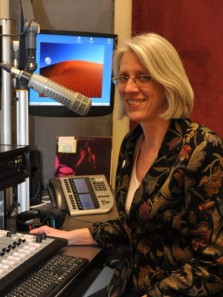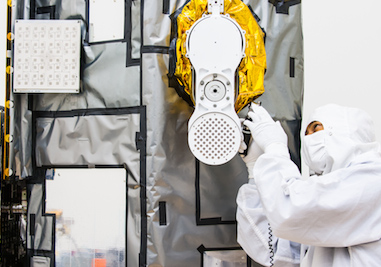Nice Above Fold - Page 381
Merged newsroom boosts St. Louis Public Radio's response to tumult in Ferguson
The aftermath of the shooting of Michael Brown in Ferguson, Mo., proved to be a critical test for the public media newsroom.Friday roundup: Smartbinge boosts WNYC traffic; McKibben praises podcasts
Plus: A controversial film spurs letters to PBS's ombud, and Cookie Monster stars in a new app.William Greaves, documentary filmmaker and Black Journal EP, dies at 87
William Greaves, a documentary filmmaker and executive producer and co-host of a pioneering public TV show for African-Americans, died Monday at his home in Manhattan, according to the New York Times. He was 87. Greaves worked as a stage and screen actor and dancer in the 1940s and ’50s and appeared in productions staged on Broadway and by the American Negro Theater. He spent most of the ’50s working as a documentary filmmaker in Canada before returning to the U.S. to form William Greaves Productions in 1964. His early documentaries for public TV included a film about the black middle class.
Roe heads classical institute, Arnold to exit WXPR, and other comings and goings in public media
Peg Arnold, g.m. of WXPR-FM in Rhinelander, Wis., begins work Sept. 22 as g.m. of Utah Public Radio in Logan.New podcast network from APM includes six new shows
Infinite Guest, a new podcast network from American Public Media, brings together feeds of broadcast programs, existing podcasts and new shows in an effort to build a digital following for audio content. Headed by Program Director Steve Nelson, Infinite Guest debuted Wednesday with 12 shows, six of them new. The podcasts are headlined by a mix of established pubmedia talent and outside personalities. “We really wanted to be able to have a way to work with people who already have a great fan base, to develop their voices in a new way,” Nelson said. “So we went out and found some people we really think are talented and great and wanted to do something different.”Crowdsourced climate-reporting project iSeeChange aims to expand with new partners
Partnerships with NASA and a research initiative in Northern California will take iSeeChange beyond its roots in Colorado.
CPB adds $6.2 million in American Graduate grants, reveals national broadcast plans
The initiative will support efforts at 33 stations to raise awareness of the dropout problem.KPCC negotiates first three-year contract with union
After 16 months of negotiations, unionized employees at KPCC in Pasadena, Calif., have negotiated their first contract with management.Sherlock adds three Emmys in primetime ceremony
Sherlock: His Last Vow, a BBC production that aired as part of WGBH’s Masterpiece, won three Primetime Emmys at the televised awards ceremony Monday. That brought the detective drama’s total Emmys to seven, the most of any program. Benedict Cumberbatch, who plays Sherlock Holmes in the series, won the Emmy for outstanding lead actor in a miniseries or movie, while Martin Freeman won for outstanding supporting actor in a miniseries or movie for his portrayal of Sherlock’s sidekick, John Watson. Writer Steven Moffat took home the Emmy for outstanding writing for a miniseries, movie or dramatic special. The drama also won four awards at the Creative Arts Emmys announced Aug.Report: SiriusXM to end The Bob Edwards Show
SiriusXM Radio will wind down The Bob Edwards Show next month, according to a Politico article published Friday. Citing unnamed sources, Politico reported that the show will end Sept. 26. Public Radio International distributes a weekly version of the show to public radio, and PRI spokeswoman Julia Yager said that program will continue. Edwards declined to comment to Current, and SiriusXM did not respond to a request for comment. Edwards worked at NPR for 30 years before leaving in 2004 for satellite radio. After hosting Morning Edition for more than two decades, Edwards left after he was moved to a position as senior correspondent.Alaska station cuts PD to offset university budget reduction
KUAC-FM in Fairbanks, Alaska, laid off programming director Jerry Evans Friday as part of ongoing measures to cut spending. According to the Fairbanks Daily News-Miner, Evans was let go as part of a plan to offset $170,000 in funding cuts imposed by the University of Alaska Fairbanks, which operates the station. Evans’s duties will be absorbed by other employees. He had been with the pubcaster for six years. The university announced in July that it would cut funding to the station in light of a $12 million shortfall of its own. The reduction imperiled KUAC’s ability to buy programming from the Alaska Public Radio Network.Tuesday roundup: Rosy prediction for PMP; OETA could face service cuts
Also: A new TiVo product targets Aereo fans.CPB gives $2.5 million to Firelight Media diversity initiative
Firelight Media, the documentary filmmaking nonprofit founded by Stanley Nelson, received a $2.55 million grant from CPB Aug. 20 to expand Producers’ Lab, a public television documentary mentorship project. Producers’ Lab recruits filmmakers and producers from underrepresented regions across the country to work with Nelson and Firelight Media to create documentaries that include a more diverse range of voices. The grant will allow the lab to add 30 to 40 more producers to the program over three years and expand its recruiting to all regions of the country. The program’s goal of adding more diversity to public TV’s airwaves was a main selling point for CPB, according to Joseph Tovares, senior vice president of diversity and innovation at CPB.Aereo takes another lump in search for legal legitimacy
Internet TV service Aereo’s bid to find a workable business model suffered another legal setback Thursday, with the U.S. Court of Appeals in New York ruling that a federal district court judge will determine whether the company qualifies as a cable operator. After losing a U.S. Supreme Court copyright fight in June to a group of commercial and noncommercial broadcasters, Aereo has tried to recast itself as a cable operator. Doing so would allow it to carry content if it pays networks for programming. Aereo initially launched as a subscription service, using banks of dime-sized antennas to capture broadcast signals and convert them into streaming video distributed over the Internet.Monday roundup: NewsHour, CPB CEO jump on Ice Bucket Challenge; San Fran nonprofit gives crowdfunding tips
Plus: PBS Kids' Chromecast strategy.
Featured Jobs





